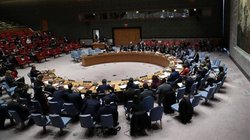 The United Nations (UN) has warned against the deteriorating humanitarian situation in Libya as fierce fighting rages on between rival forces for control of the capital, Tripoli.
The United Nations (UN) has warned against the deteriorating humanitarian situation in Libya as fierce fighting rages on between rival forces for control of the capital, Tripoli. RNA - UN humanitarian coordinator for Libya Maria do Valle Ribeiro issued the warning in an interview with AFP late Sunday, amid clashes that continue in and around Tripoli between forces loyal to Libya’s internationally-recognized Government of National Accord (GNA) and those allied with the so-called Libyan National Army (LNA) led by renegade general Khalifa Haftar.
"As long as the situation continues, even if it just stagnates and continues like this, we can expect to see a continuing deterioration," Ribeiro told AFP. "When we see the use of air power, the indiscriminate shelling of densely populated areas, it is very difficult to be optimistic.”
The UN official made the remarks after the GNA reported that air raids by the LNA had killed four people and wounded 20 others in Tripoli a day earlier.
"We continue to call for a respect of civilians, we continue to call for humanitarian pauses and most of all we continue to hope that the situation can return to a more peaceful settlement of the crisis," Ribeiro said.
The UN official also voiced concern over a breakdown in basic services, including electricity and water supplies, and said more relief funds were needed for the oil-rich African country.
GNA decries UN ‘silence’ on Haftar attacks
Separately on Sunday, the Tripoli-based Government of National Accord held the UN Security Council responsible for refraining from taking action regarding attacks carried out by Haftar’s forces on the Libyan capital.
The GNA “holds the UN mission and Security Council responsible for their silence and complacency towards the actions of the criminal Haftar,” the government said in a statement.
It went on to say that since the Libyan renegade general failed to make progress on the ground, he has resorted to seek support from “foreign air forces to strike civilians and the unarmed in the city”.
Libya has been divided between two rival governments - the House of Representatives based in the eastern city of Tobruk and the GNA headed by Libyan Prime Minister Fayez al-Sarraj in Tripoli.
The 75-year-old Haftar who enjoys the loyalty of a group of armed militia and backing from Saudi Arabia, the United Arab Emirates and Egypt has taken upon himself to protect the government in Tobruk.
Armed forces and militia loyal to the GNA have been fighting back.
Libya’s crisis began to escalate on April 4 when forces loyal to Haftar launched a deadly campaign to invade and conquer Tripoli.
The International Committee of the Red Cross (ICRC) has recently said that intensified fighting for control of Tripoli was turning the densely-populated residential areas of Tripoli into “battlefields.”
According to the World Health Organization (WHO), the fighting has so far killed at least 278 people and wounded more than 1,300 others. The International Organization for Migration (IOM) also reported that about 39,000 people have been displaced by the clashes.
Libya has been the scene of increasing violence since 2011, when former dictator Muammar Gaddafi was toppled from power after an uprising and a NATO military intervention.
His ouster created a huge power vacuum, leading to chaos and the emergence of numerous militant outfits, including the Daesh terrorist group.
847/940